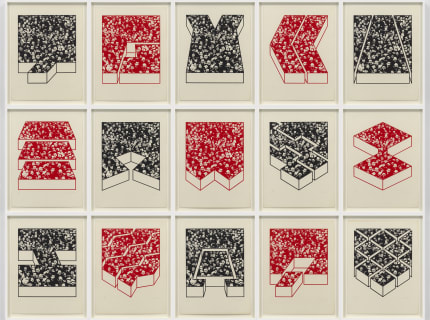Limiares: Paço das Artes
Regina Silveira's solo exhibition Limiares at the Paço das Artes, São Paulo, Brazil.
The institution's press release follows:
Paço das Artes presents its inaugural exhibition, Limiares, an unprecedented show by the multifaceted artist Regina Silveira, one of the creators with a greater presence in contemporary Brazilian art. The exhibition, curated by Priscila Arantes, Director of the institution, will run from January 25 to May 10 with free admission.
The exhibition's title was chosen by Priscila Arantes not only because Limiar is exhibited, but also because of the symbology of the meaning of the word, which refers to ideas from the beginning, from the initial stages, such as the special occasion of inauguration the new and definitive headquarters of the institution. In addition, Regina Silveira's process often presents features designed for space where the works are allocated, as in the case of Dobra and Cascata, unpublished works created for Paço das Artes. Both works relate to the architecture of the environment where they will be installed and problematize issues from the perspective, dialoguing directly with the new space where Paço das Artes will be operating, exploring the power of this place and its entire territorial context.
The choice—also symbolic—for a female artist is part of a curatorial vision and strategy that has always considered and contemplated the representation of women in the field of arts. Thus, the choice for the work of Regina Silveira on this occasion is naturally due to the history of her projects carried out at the institution, especially during the long period (of more than two decades) when Paço das Artes was at USP.
In the work Dobra, the artist rescues works that subvert the perspective system she has carried out since the 1980s, when, sometimes, she used images originated from photographs as in the Anamorfas series in which everyday objects were taken, if observed from a certain height or certain angles, new shapes or redesigned their images breaking with the idea of Renaissance linear perspective. In Dobra, for example, it is possible to view a garden bench in the outside area of Paço, from a certain point of observation.
The work Cascata is a version created for the Paço das Artes, using methods already presented by the artist in other works such as Lumem at the Crystal Palace, organized by the Reina Sofia Museum in Madrid. There, the universe of lights and shadows was explored in dialogue with the natural light and transparency of the palace, starting from the real architectural forms and exposing its concept of distortion, as well as in Clara Luz, shown at the CCBB of São Paulo, where she addressed the issue of deconstruction, the real and the virtual. Cascatas will present the multiple reproduction of the original windows of the building of the new building where Paço das Artes is housed.
The video installations Limiar and Lunar, in addition to being part of the exhibition, will be donated to Paço das Artes to inaugurate its collection, as mentioned previously, the first contemporary art in São Paulo exclusively digital and reproducible works. Thus, Paço das Artes advances in its mission of promoting dialogue between the public and contemporary art with the launch of its collection, integrating it into the MaPA project, a digital platform for contemporary art, which brings together all artists, critics, curators and jury members who went through the Project Season.
In Limiar the artist works on the plastic issue of light, fascinated by several artists and very present in her projects. In it, the word “light” is displayed in 76 languages, expanding and turning into light, giving the idea of pause, breathing, the life that pulsates, the beginning. And that, in the view of the curatorship, alludes to the new life of Paço das Artes in that space. Lunar, on the other hand, is a kind of ballet of two spheres, in a choreography with light and leftover, inserted in a basic space and that plays with the notions of perception and perspective of the observer.
In addition to Limiar and Lunar, visitors will be able to check out the other video works donated by Regina Silveira at the exhibition. They are: Campo (1977), The art of drawing (1980) and Morfa (1981).


